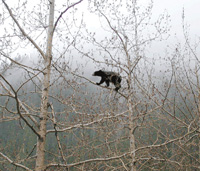If an attack occurs
Black bear attacks are rare! However, if one occurs, there are varying recommended responses depending on the situation. Remember that these are only guidelines and that each encounter is unique.
Defensive attack:
If you surprise a bear and it responds to defend itself, its young or its food - and contact has been made or is imminent - play dead (lie on your stomach with your legs apart; protect your face, the back of your head and neck with your arms; remain silent; and if wearing a pack, leave it on for protection). Remember: such attacks are rare despite the much more common aggressive displays without contact by black bears. The bear will leave you alone once it believes the threat is passed.
Offensive attack:
This is the most serious and potentially deadly attack a black bear might make! It occurs when a bear appears to stalk or follow you for a period of time and then chooses to attack; or the bear attacks you at night. In this situation, playing dead is not appropriate. Try to escape to a secure place such as a vehicle or hard-sided camper.
 Bears can climb in trees
Bears can climb in trees© Parks Canada / Jean Morin
Climbing a tree is an option, but remember that black bears can climb trees easily. If you cannot escape and a bear continues its pursuit, react aggressively and try to intimidate the bear. If this fails, fight back with anything at hand such as bear spray, rocks, sticks, knives or other possible weapons to let the bear know that you are not easy prey. Act as a group if you are part of one. Don't forget to yell; help may be close by.
Chemical bear repellents/bear sprays contain a derivative of cayenne pepper. When sprayed directly into an animal's face, they cause eye and upper respiratory tract irritation. Although such sprays can be effective when used properly, wind and other circumstances may alter their effect on the animal. Therefore, use them with caution and always follow the manufacturer's directions. Bear sprays do not guarantee your safety.
- Date modified :